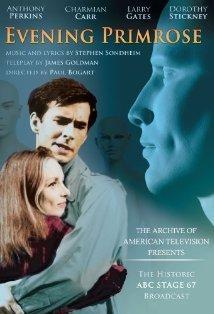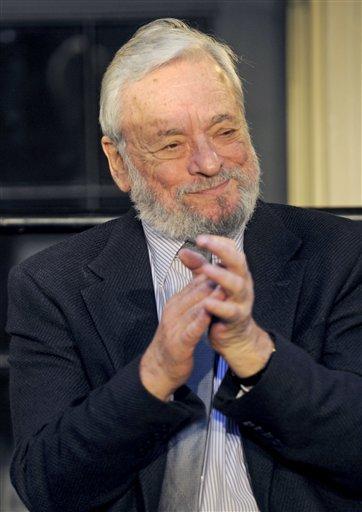Advertisement
Long-Lost Sondheim Music Brought Back To Life

Famed Broadway composer and lyricist Stephen Sondheim wrote the music for "Evening Primrose," a 1967 television production. But the show was a failure and only aired once, leaving Sondheim's music to the dustbin, despite the fact that it was critically acclaimed. Now "Evening Primrose" is on DVD and Stephen Sondheim fans are rejoicing. Here & Now's critic-at-large Ed Siegel tells us why.
Review: 'Evening Primrose' Gives Sondheim Fans A Reason To Rejoice
By ED SIEGEL
BOSTON — “Evening Primrose” — the very title makes Stephen Sondheim fans weak at the knees. It was shown once – in 1967 and then never again commercially.
It’s been the stuff of poor quality bootleg tapes since, but now a sharp new copy has been remastered by the Archive of American Television and E1 and is available on home video.
It aired on a program called ABC Stage 67, which is a whole story in itself. This was an attempt by ABC in the mid-‘60s to bring back the prestige of the 1950s Golden Age of Television, when the other two networks, NBC and CBS, were in the business of live arts programming. Those days were gone, but not quite forgotten and “Stage 67’’ wanted to bring them back with a series of programs that would bring many of the country’s most renowned artists into America's living rooms, including the young Stephen Sondheim and Bob Dylan.

So Sonheim’s collaboration with writer James Goldman aired in 1967, but in terms of ratings and even critical acclaim, the series was a dismal failure and “Evening Primrose’’ was never seen again commercially, despite the star power of the leads, Tony Perkins and Charmian Carr, Liesl in “The Sound of Music.’’
And if that sounds bizarre, so is the story. Perkins plays Charles, a poet, who has decided that he is through with the world and he decides to hide out in a New York department store after everyone has gone for the day. As we hear in one song, he thinks he's found the perfect new home.
What’s particularly exciting, that you can hear in the very first song, is Sondheim becoming Sondheim – a thematically and harmonically different composer from what we’ve heard before. As Charles turns away from the world, he lists his dissatisfaction in a staccato, sing-song, which soon takes flight into torrents of brilliant rhyming and melodies that fit like a glove.
Advertisement
While hiding from the night watchman, he finds that many of the store mannequins are people who have had the same idea of their own and formed a community within the store. One of them, though, is not there of her own volition. Ella, played by Carr, fell asleep in women’s hats when she was 6, and forced into servitude lest she give their secret away.
When you hear her big solo, the gorgeous “I Remember,” played at Sondheim revues it’s always seemed like the song of an older woman from “Follies” or “A Little Night Music” looking back wistfully, but there’s an added melancholy and heft when you hear it in its proper context, of a young woman deprived of her place in the world.
The other famous number in the show is one of Sondheim’s best, “Take Me to the World,” a song of liberation and inspiration as Ella, now in love with Charles, begs him to bring her back to life outside of the department store. (It was supposed to be Macy’s, but cold feet prevailed, so Stern’s filled in.)
The song is usually done as a solo in revues, but here it’s a highly dramatic, plaintive duet between the two. Perkins is no Mandy Patinkin, but he knows how to sell a love song surprisingly well for someone more renowned as a psycho killer.
So why haven’t we seen “Evening Primrose” until now? “Stage 67” was canceled after many of the programs, this included, failed with both audiences and critics. There never was much of a market for failed musical theater videos. And it wasn’t until the Archive of American Television was looking into making a DVD of the show, that a good kinescope was found.
Not that it doesn’t look dated. In general, old TV video doesn’t hold up well and they never found a color transfer. An extra of Curtis doing location shots shows that this would have really benefited from the original color. (It doesn’t help that James Goldman’s adaptation of John Collier’s short story is a clunker, with an ending more in keeping for “The Twilight Zone” than musical theater.)
There’s a wonderful telephone interview with Charmian Carr, who became an interior decorator after her ex-husband insisted she quit acting. When she was redoing Michael Jackson’s house he told her he was a big fan of “Evening Primrose” and wanted her to fill part of his house with – you guessed it — mannequins.
One other noteworthy piece of trivia. “Evening Primrose” had its production schedule moved up when Dylan’s “Eat the Document” fell through. The otherwise terrific liner notes imply it was because of his motorcycle accident, but Dylanology has long held – correctly, I believe — that ABC hated Dylan’s and D.A. Pennebaker’s sequel to “Don’t Look Back.”
I can remember being so angry at ABC that I refused to watch the “dumb musical” back in ’67. So maybe now the Archive can talk Dylan into releasing the “Stage 67” that never was, along with the Sondheim that’s now rejoined his brilliant oeuvre.
This segment aired on November 16, 2010.